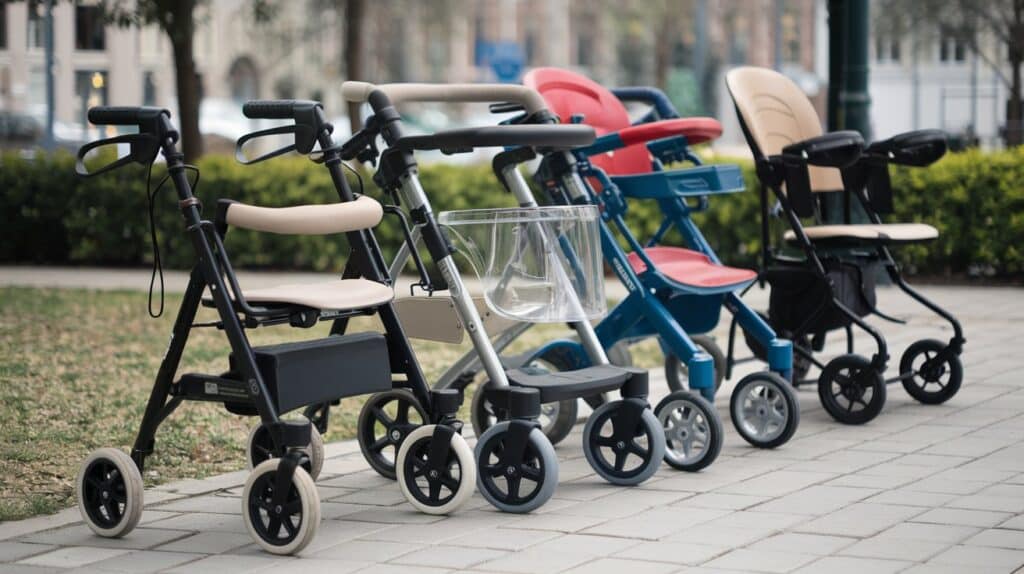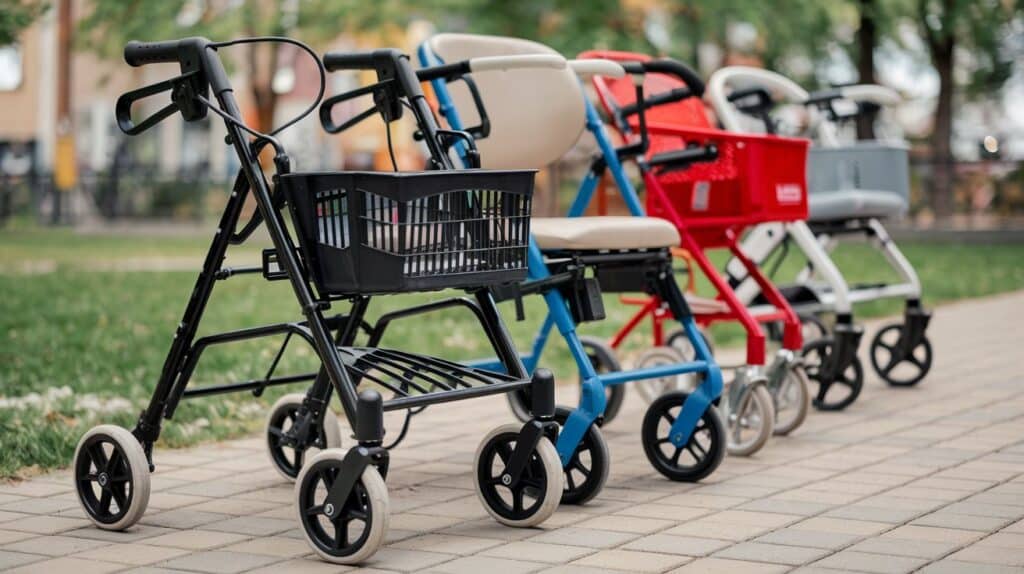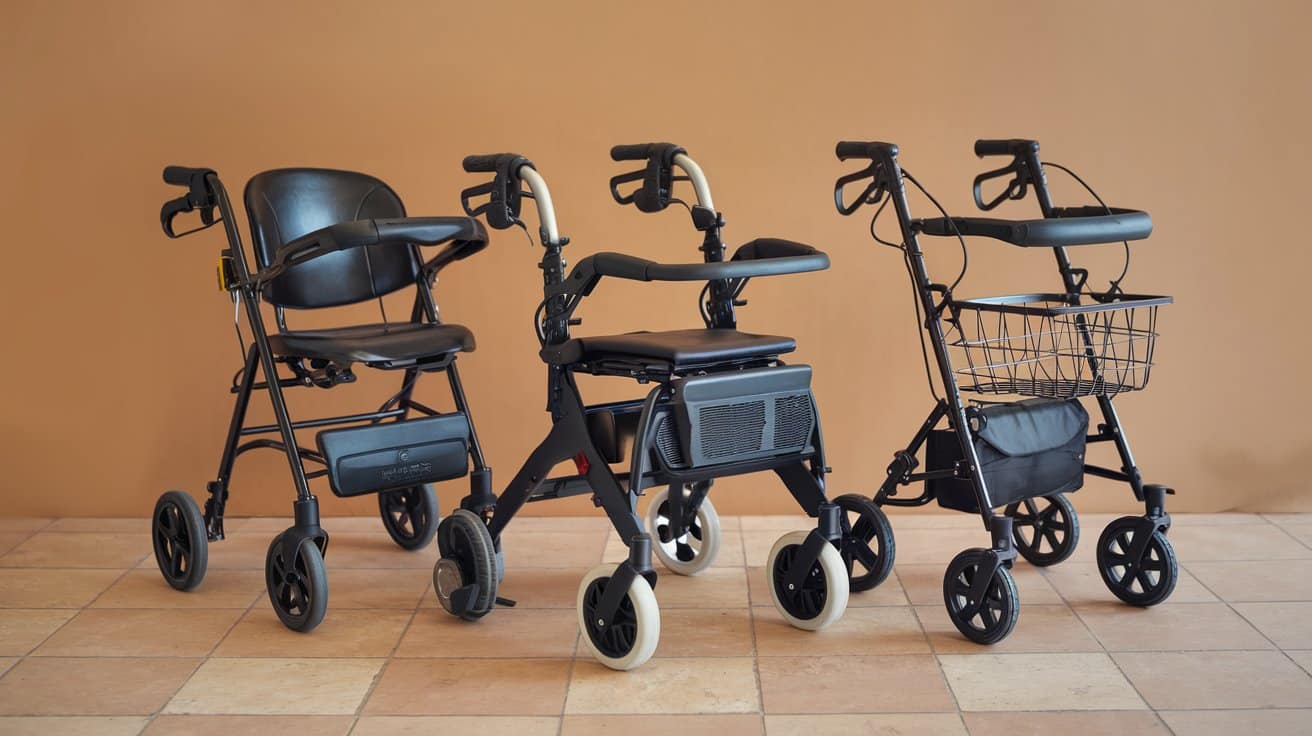Explore all types of rollators and medical walkers through this thorough guide to help you understand their features and functions. Gain insights into selecting the perfect rollator and how it caters to specific mobility requirements.
Types of Rollators- Demystifying Medical Walkers
Rollators are super helpful for people who need a little extra support to move around. They can really boost independence and make it easier to get around, no matter your physical ability. Knowing about the different types of rollators can help you pick the right one for you.
Walking Upright with Standard Walkers
Standard walkers are great for folks who need help while walking. They help keep you standing straight and are usually light and foldable, which makes them easy to carry. You can adjust the height too, so it fits just right for your comfort. The Silver Adult Standard Folding Walker is a popular choice because it gives solid support without being too complicated.
All-Terrain Navigation with Two-Wheel Walkers
Two-wheel walkers are made to work well on different surfaces while still being stable. With two wheels in front and rubber tips at the back, users can lift the walker a bit when going over bumps or uneven ground. This type is perfect for those who love spending time outside or need to move through various places, making it a flexible option among mobility aids.
Enhanced Stability with Three-Wheel Rollators
Three-wheel rollators mix easy movement with stability. They’re especially handy in tight spots where a four-wheel walker might be too big. Their design makes turning corners and getting around obstacles easier while still giving good support for those who need it. These rollators are light yet strong, making them ideal for indoor use or short trips.
Maximum Maneuverability with Four-Wheel Rollators
Four-wheel rollators offer the best maneuverability and often come with cool features like seats and storage baskets. These models work well for people needing more support but also want a place to sit down when they get tired. Many four-wheel rollators let you change the handle height so everyone can find their comfort zone during longer outings.
Beyond Basic Walkers- Benefits of Rollators
Rollators do more than just help you walk; they provide many benefits that make life easier:
- Increased Mobility and Independence: With a rollator’s sturdy support, users can move confidently without needing someone else’s help.
- Enhanced Balance and Support: The design helps keep you stable, reducing fall risks.
- Fall Prevention and Confidence Boost: Having reliable support encourages users to participate in daily activities.
- Comfort and Convenience with Seating and Storage: Many rollators include seats for resting as well as storage options to carry personal items easily.
Understanding these benefits shows how picking the right type of rollator can really improve someone’s quality of life!
Selecting the Perfect Rollator for Your Needs
When you’re picking a rollator, it’s super important to think about what you need and what works for you. Start by looking at your physical abilities and any mobility challenges. Are you healing from surgery, or do you have a condition that makes it hard to keep your balance? Knowing these things will help you choose the right rollator.
Individual Assessment- Matching Rollators to Physical Abilities
First, check how mobile you are. If you’re having serious strength issues or need extra support, a bariatric rollator might be the way to go. These are made for heavier weights and give more stability. But if you’re after something light and easy to use indoors, a three-wheel rollator could be perfect. It’s small and fits well in tight spots.
Sizing Considerations- Determining Appropriate Height and Width
Getting the right size is key for comfort and safety. Measure how tall you are and compare that with the rollator’s specs to make sure the handles can adjust properly. When standing next to it, the handles should line up with your wrists. This helps keep your back straight while using it, which is super important.
Functionality Features- Seat, Basket, Brakes, and Accessibility
Look for features that make life easier:
- Seat: A seat lets you take breaks when you’re out.
- Basket: Baskets are handy for carrying stuff like groceries or personal items.
- Brakes: Good brakes are a must for safety; they should work easily when you want to stop.
Think about which features fit best with how you live your life. If you’re often running errands or enjoying long walks in parks, having a basket can really help.
Wheel Options- Choosing Between Small, Medium, and Large Wheels
The size of the wheels can change how well your rollator moves:
- Small Wheels: Best for indoor use on flat floors.
- Medium Wheels: Good for both inside and outside.
- Large Wheels: Better for rough outdoor paths where stability is key.
Picking the right wheel size can really improve how much fun you have with your rollator.
Essential Factors to Consider When Shopping for Rollators
When shopping for rollators or walkers, keep these important factors in mind:
- Height Adjustments: Make sure the model lets you adjust the height so it feels comfy.
- Weight Capacity: Check that it meets your weight needs; this is super important for safety.
- Durability and Stability: Look at what materials it’s made from; aluminum frames are strong without being too heavy.
- Foldability: See how easy it is to fold up the rollator for transport or storage; this adds convenience every day.
By thinking about all these points when choosing a rollator or walker—whether it’s a standard type or something more specialized—you’ll boost both safety and mobility in your daily activities!

Caring for Your Rollator- Maintenance and Troubleshooting
Keeping your rollator in good shape is super important. Regular rollator maintenance helps it last longer and work better. One key part of this is cleaning. A clean rollator prevents rust and keeps things hygienic. Use a damp cloth to wipe down the frame and parts, but be careful not to get too much moisture on any electrical bits if your model has them.
Check the wheels and brakes regularly for debris that can block movement or braking. If you see dirt or anything stuck, clear it out right away.
Also, inspecting the brakes is vital for safety. Make sure they work smoothly when you apply them. If you spot any wear or problems, think about replacing brake components with quality replacement parts made for your specific model.
Don’t forget to look at the seat and cushion too! Comfort matters, especially if you’re using your rollator for a long time. If these parts show signs of wear, consider options from durable medical equipment suppliers.
Maximizing Rollator Usage- Tips and Best Practices
To get the most out of your rollator, knowing how to use it properly is key. Start by practicing proper braking techniques—engage the brakes before coming to a stop to stay safe. This becomes really important when you’re on inclines or in crowded areas where quick stops might be needed.
When facing obstacles like steps or thresholds, take your time! Approach these slowly; using ramps can make things easier instead of trying to climb steep steps directly.
Transporting your rollator should be easy too! Learn how to fold it up if that’s an option so you can store it in cars or at home without hassle. When you’re not using it, keep it in a dry place to avoid rust on metal parts.
You can also enhance your experience by adding accessories like cupholders or baskets designed for your model. These walker features make outings more convenient by giving you extra space for personal items while moving around freely.
Regular maintenance and smart usage tips are essential for keeping your rollator functional and safe over time. By following these guidelines on rollator maintenance and maximizing its use, you’ll enjoy better mobility support while improving your overall experience with this important mobility aid.
Rollators Tailored to Special Needs
Bariatric rollators are made for heavier folks, giving them extra support and stability. These rollators usually have strong frames and wider seats to keep users comfy. When picking a bariatric rollator, it’s key to check the weight limit and how tough the device is. This way, it can safely help with mobility.
Rollator walker hybrids mix the features of a regular rollator with those of a transport chair. This handy design lets users get mobility support while having a cozy seat when they need it. When choosing this type of walker, think about how easy it is to switch between functions and how light it is for carrying around. A good hybrid model can boost independence by offering flexible mobility options.
Outdoor rollators are built for rough paths, featuring bigger wheels and better grip. These models work great for users who love outdoor fun or live in places with bumpy ground. When selecting an outdoor rollator, look for features that improve stability and comfort during long use. Options like shock-absorbing wheels can make a big difference on uneven trails.
Special Considerations for Rollator Selection
When picking a rollator for specific medical conditions like arthritis or multiple sclerosis, it’s important to think about how these issues affect movement. For example, people with arthritis might find models with comfy grips and lightweight frames helpful since they lessen strain on joints.
Environmental factors also matter when choosing the right rollator. If you’re using it indoors in tight spots or narrow hallways, compact models might be best because they’re easier to move around. On the other hand, if you often go outside, go for stronger designs that come with larger wheels for better traction on rough surfaces.
Personal choices like style and color can also affect which rollator you pick. Many brands now offer customizable options so users can choose colors or extra accessories that match their taste while still being functional. This personalization helps users feel more at ease and confident when using their mobility aids.
Selecting the right rollator means thinking about different things like medical needs, where you’ll use it, and personal likes. By focusing on these aspects, you can find a device that meets your physical needs while fitting into your lifestyle too!

Rollators- Empowerment Through Mobility
Final Thoughts on Choosing and Using Rollators
Choosing the right rollator is super important for boosting mobility and keeping you safe. When picking a rollator or walker, think about what you need. For example, check if it has height adjustments to help with your posture and make sure it can hold your weight for durability. It’s also a good idea to talk to healthcare professionals who can give you advice based on your specific health needs.
Taking care of your rollator is key for it to last long. Regular cleaning helps prevent rust, and checking the brakes ensures they work well when you need to stop. Learning how to use your rollator correctly can really improve your experience. For instance, knowing how to brake properly will help you move safely in different places.
Tailoring Rollators to Individual Needs
Everyone has different needs based on their physical abilities and lifestyle. To find the right rollator, think about what works best for you. Look for features like adjustable height settings that fit various users and weight capacities that match individual requirements.
Consulting Healthcare Professionals
Getting advice from healthcare professionals is really helpful when choosing a rollator. They can suggest models that suit medical conditions like arthritis or Parkinson’s disease. Plus, they keep you updated on the latest in medical walkers.
Improving Quality of Life
Rollators do more than just help you walk; they can really boost your quality of life! With better mobility comes more independence, allowing users to join social activities and handle daily tasks more easily. Features aimed at fall prevention can help users feel more confident moving around without fear.
By understanding the types of rollators available along with their features, you’ll be better equipped to make a choice that fits your personal needs and lifestyle preferences. Consulting healthcare experts while considering what works best for you will lead you to find a suitable rollator that enhances mobility while ensuring safety and comfort.

